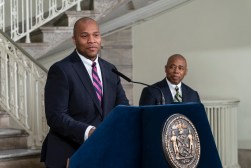New York City unveils new set of strategies for improving online government services

New York City Mayor Bill de Blasio has unveiled a new roadmap for the city’s digital strategy, with a focus on how the government can use technology to make its services more accessible to city residents.
De Blasio announced the new “NYC Digital Services Playbook” with an event at a civic-tech-focused community center Monday, as part of his administration’s push to blend its IT efforts with its work to make the city more equitable.
The playbook itself lays out six broad strategies for how the city plans to use technology to improve citizen engagement with government services: Welcome all New Yorkers, make government simple, listen and respond, reach people where they are, protect New Yorkers’ trust and build collaboration.
“We need to reach out to New Yorkers and invite them to use city services,” de Blasio said at the event. “That’s something the city has really fallen down on in past years.”
De Blasio said part of this inspiration for his renewed focus on the city’s technology was his own experience with digital government services. As he tried to fulfill his campaign promise of making pre-kindergarten programs available to every 4-year-old, he discovered that the process of using city web services to get kids signed up for the classes was incredibly difficult, requiring parents to download a form and mail it to a city agency.
He worked to streamline that process, and even directed the city to build a smartphone app to help parents find and apply for the programs. Now, he thinks that sort of online overhaul is in order for the rest of the city’s systems.
“We’re trying to simplify every transaction people do online with the city,” de Blasio said. “If a city service is difficult to access, in an ever more busy age, then people just won’t do it.”
[Read more: New York City refines open data policy with new laws]
The playbook would also direct city agencies to “design for mobile devices first” and make services available in the widest range of languages possible, since de Blasio is aiming to make the government responsive to every citizen in what he said is “the most diverse city on Earth.”
As more people use the city’s online services, de Blasio hopes that agencies become more receptive to suggestions from citizens about how they can improve, creating what he dubbed a “response culture” within the government.
“It bothers me deeply that New Yorkers actually have lots of things that would save time, money and energy, but can’t get it through the screen,” de Blasio said. “We’re dealing with the immediate needs all the time, things that are always in front of your face. But everyday people will see solutions and information and manipulate it in a way that we may not. We in government did not corner the market on good ideas.”
Similarly, the playbook puts an emphasis on building services in response to the needs of citizens, rather than the needs of city agencies, and pulling in partners from the private sector and the civic hacking community to help identify and meet those needs.
So far, the civic tech community has embraced de Blasio’s playbook. BetaNYC, a group of civic hackers and open government advocates, released a statement praising the initiative as something that will help people around the city “champion equitable services built for the 21st century.”
“We are excited to see the mayor launch a digital services playbook that brings together the best ideas from inside and outside of government,” Noel Hidalgo, the group’s executive director, wrote. “This digital services playbook lays down a unified foundation for the first half of 21st century.”
Indeed, de Blasio stressed that he views the playbook as a vital piece of his administration’s work to address income inequality in the city. The document puts a focus on identifying which areas in the city still lack broadband access and addressing that need to use technology to champion equality.
“We’re matching this to our overall efforts to address inequality,” de Blasio said. “What we’re trying to do is increase broadband access, and that connects directly to what we’re doing to improve access to affordable housing, mass transit and all these other city services.”
Contact the reporter at alex.koma@statescoop.com, and follow him on Twitter @AlexKomaSNG.






